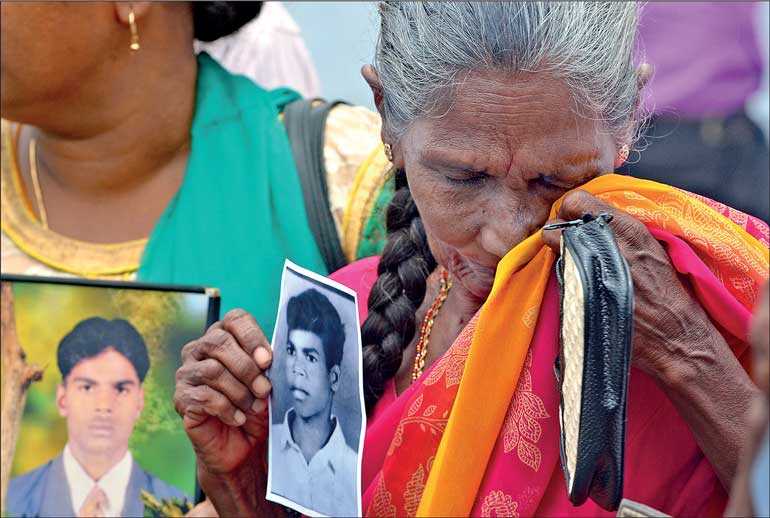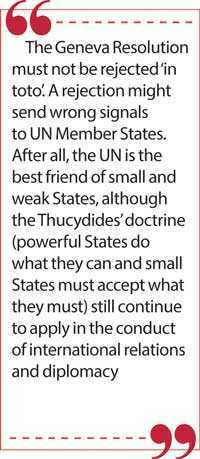Tuesday Feb 10, 2026
Tuesday Feb 10, 2026
Friday, 12 February 2021 00:00 - - {{hitsCtrl.values.hits}}

Unfortunately, the civilian victims, especially women who have lost their husbands or children have not been adequately compensated – Pic by Shehan Gunasekara
“Treaties and non-treaty instruments are the bones and sinews of global politics, making it possible for states to move from talk through compromise to solemn
commitment.” – Professor Thomas M. Frank (Taking Treaties Seriously [1988] 82 AJIL 67)
 Implementation of the Geneva Resolution is an onerous task. It will encounter various challenges and dilemmas. It requires the establishment of institutional structures and national legislation to give effect to operative part of the Geneva Resolutions. Implementing legislation must not offend the 1978 Constitution and the 1976 Vienna Convention of the Law of Treaties (VCLT 1976)
Implementation of the Geneva Resolution is an onerous task. It will encounter various challenges and dilemmas. It requires the establishment of institutional structures and national legislation to give effect to operative part of the Geneva Resolutions. Implementing legislation must not offend the 1978 Constitution and the 1976 Vienna Convention of the Law of Treaties (VCLT 1976)
The Geneva Resolutions
The Geneva Resolution can be classified as a non-treaty instrument. It is different from a treaty in many respects (Anthony Aust – Modern Treaty Practice). It does not require the consent of the State to be bound by such Resolutions. It has a preambular and operative part. It is likely to be interpreted in the same way as a treaty by reference to articles 31 and 32 of the VCLT 1969. It resembles the Resolutions of other UN Specialised Agencies such as IMO or ICAO which are of a binding nature.
The proposed Geneva Resolution is likely to be different and devastating for Sri Lanka if it is based on the Report of the UN High Commissioner for HR. If so, it is desirable at this point of time to draft a counter resolution and outline Sri Lanka’s proposals relating to reconciliation and accountability without taking a confrontational approach at this time.
Operative part of the Geneva Resolutions
Implementation of the operative part of the Geneva Resolutions can be dealt under four areas. These areas are – (a) Establishment of a truth-seeking and reconciliation commission; (b) Investigation into violations relating to human rights and international humanitarian law (IHL); (c) Reparation to victims; and (d) Guarantee of non-recurrence. All these areas are seen as an integral part of transitional justice.
Truth-seeking and reconciliation
Establishment of a Commission for Truth-seeking and Reconciliation is an important consideration in dealing with transitional justice. It is a sensitive area. It can ‘open old wounds’ and therefore such investigation should not be undertaken in Sri Lanka. It can create ‘new wounds’ that can get festered over a period of time. If so, the situation might become worse for reconciliation.
In South Africa, such commission was established under National Unity and Reconciliation Act No. 34 of 1995. It was necessary to do so as apartheid was an inherently anti-democratic and unjust system perpetrated by a white minority. The global community denounced apartheid with sanctions and recognised the right to self-determination by the majority community. In Sri Lanka, LTTE was engaged in an armed conflict to establish a separate state in defiance of the Constitution and International law. The global community proscribed LTTE as a terrorist organisation.
Hence, we should gently reject this requirement in the preambular part by reciting the reasons as outlined above.
Investigation into violations relating to human rights and humanitarian law
Geneva Resolutions require investigation into violations relating to human rights and international humanitarian law (IHL). It is a requirement of transitional justice. Investigation should not be restricted to the final phase of the war, where Sri Lankan security forces had to proceed, amidst protests, to save the territorial integrity and sovereignty of Sri Lanka from the tentacles of the rebel forces who used child soldiers and civilians as a human shield.
The Resolution requires Sri Lanka to establish a credible domestic mechanism. It must be fair to the accused as well as to the victims. The Resolution requires the inclusion of Commonwealth judges and prosecutors along with national judges and prosecutors. Inclusion of Commonwealth Judges and Prosecutors may encounter political and constitutional issues. In this context, when formulating the Report on Sri Lanka, the UN High Commissioner for Human Rights should read article 46 of VCLT 1969 which says that any treaty or non-treaty instrument should not offend the fundamental principles of the Constitution.
Any investigation relating to violations of human rights law or IHL would be dangerous in Sri Lanka, unless such investigation is conducted as a non-international armed conflict under common article 3 of Geneva conventions 1949. Unfortunately, in Sri Lanka, the Common Article 3 was not given effect to by the Geneva Conventions Act of 2006. The initial draft Bill prepared by me in 2001 incorporated the provisions relating to Common Article 3 of the Geneva Conventions of 1949 (draft Bill is on file with me) on the advice of the top legal advisers at ICRC headquarters in Geneva.
These legal advisers came to the conclusion after consulting Jean Simon Pictet’s five points enshrined in the negotiating record (travaux preparatoires) of the Geneva Conventions 1949 and I was given the go ahead to draft the requisite legislation.
International human rights standards are also not properly transformed into national legislation in Sri Lanka. There are many ‘deficiencies’ and ‘inconsistencies’ in our national legislation. Assistance to and Protection of Victims of Crime and Witnesses Act, No. 4 of 2015 requires substantial amendments.
Unless international human rights standards are properly transformed into the domestic legal system by way of new legislation or amendment to existing law using the correct legislative techniques, any domestic mechanism established for this purpose will not be effective and will not be able to function according to international standards.
Operative part of the resolution will recite that accountability will be determined under common article 3 of the Geneva Conventions of 1949 and therefore national legislation needs to be enacted to incorporate common article 3 of the Geneva Conventions to the existing Geneva Conventions Act 2006 (A draft Bill is annexed as a schedule to this paper to illustrate the requisite amendment).
 Reparation to victims and tracing missing persons
Reparation to victims and tracing missing persons
Reparation to victims is also an important requirement under Geneva Resolutions to promote reconciliation. Legislation has been already enacted to establish a domestic mechanism for such reparation. The amount granted is too small and may be increased in the future.
It does not take into account reparation already provided to victims of war either through legislation or army routine orders or Cabinet Memoranda.
Unfortunately, the civilian victims, especially women who have lost their husbands or children have not been adequately compensated. Hence, there is a great need to compensate civilians who have suffered due to eviction, injuries, unlawful killing and/or and those who have suffered due to suicide bomb attacks. The legislation must clearly identify those who are really entitled to these benefits in the context of Sri Lanka’s armed conflict.
Operative part should recite the continued implementation of national legislation relating to reparation and of missing persons.
Guarantee of non-recurrence
Guarantee of non-recurrence is a very challenging requirement of the Geneva Resolutions.
In most countries, the reconciliation between ethnic and religious groups are handled by an Ethnic Relations Commissions. In developing countries such as Guyana and Trinidad and Tobago, these Commissions are established through constitutional provisions. These Commissions are empowered by law to take action where there is a threat to ethnic or religious harmony.
These Commissions have produced enormous literature relating to peace, harmony and development and organised drama festivals to promote racial and ethnic reconciliation. I have seen many plays written by Eric Brathwaite in Georgetown and Port of Spain and cried how backward my beloved country is in regard to reconciliation and creating ethnic harmony and unity. We have not understood that national security is ethnic harmony and unity, and ethnic harmony and unity is national security.
These Commissions are empowered to refer any matter to a Tribunal established by legislation. Such matters include ‘hate speech’ or any act which causes ethnic disharmony. Issues relating to burial or cremation regard to those who died from COVID-19 should be referred to such a Commission and not to politicians or religious bigots.
Establishment of an Ethnic Relations Commission and a Tribunal may satisfy the reconciliation requirement, as these Commissions have prevented a fully-fledged armed conflict between diverse religious groups and ethnicities in many countries.
Operative Part should recite the establishment of such institutions to make reconciliation more effective and efficient. It can be described as a 13+.Ethnic harmony is national security.
Additional requirements
Geneva Resolutions imposes additional requirements. These include the full implementation of the 13th Amendment, reform of the Prevention of Terrorism Act and the Public Security Ordinance. Implementation of the 13th Amendment, PSO and the PTA is part of the ‘domain reserve’ under article 2(7) of the Charter of the United Nations. Hence, such intervention is not fair and legitimate.
Impact on State sovereignty
Implementation of the Geneva Resolutions and the recent Report of the HR Commissioner can impact on State sovereignty. In today’s world, State sovereignty is diminished through ratification, accession or succession to treaties. A treaty ‘per defitionem’ may restrict State sovereignty. However, a non-treaty instrument is not in the same category unless there is express or implied consent to be bound by it. Co-sponsoring gives implied consent.
In regard to ratified treaties, a State cannot hide behind state sovereignty to avoid international obligations. International compliance and control measures established by various legal regimes demonstrate that state sovereignty is diminished and the Westphalian Order does not exist anymore in its pristine form.
Implementation of the Resolutions may offend the provisions of the Constitution. In Sri Lanka, the Constitution grants sovereignty to the people and its elements are enshrined under Article 4 of the 1978 Constitution of Sri Lanka. If the legislative implementation of the proposed Resolution offends the Constitution, Sri Lanka should propose an alternative counter resolution which is in harmony with our constitutional provisions.
Conclusions
Implementing the Geneva Resolutions is an exacting task. It will encounter many challenges and dilemmas. The draft report evinces that the High Commissioner has not understood the atrocities committed by the rebel forces or ‘Kadi’s Case’ in the European Court of Justice on freezing of assets without due process.
The High Commissioner has gone on to declare unfairly and wrongly that security forces who saved Sri Lanka’s territorial integrity and sovereignty as enemies of mankind (Hostes Humanis) by subjecting them to universal jurisdiction and International Criminal court (preambular part).
At this time, we must not forget that President Mahinda Rajapaksa saved the country from the rebel forces. If not for him, the armed conflict would have dragged on for many years. In this context, he was assisted by India, Pakistan, USA and many other countries. He was also assisted by the Defence Secretary, Army Commander and many others. Since then, we have enjoyed freedom from fear and freedom from unlawful killing (preambular part need to recite this fact).
The Geneva Resolution must not be rejected ‘in toto’. A rejection might send wrong signals to UN Member States. After all, the UN is the best friend of small and weak States, although the Thucydides’ doctrine (powerful States do what they can and small States must accept what they must) still continue to apply in the conduct of international relations and diplomacy. Notwithstanding the aforementioned phenomenon, the UN has assisted small and weak States in situations where might is not right. Let us engage with quiet diplomacy and convince the international community to go along with our counter resolution (preambular part needs to recite some of these observations).
Hence, it is necessary to draft a counter resolution and identify how we intend to deal with reconciliation and accountability taking into account ground realities, constitutional provisions and the political ramifications.
We need to understand Morgenthau’s realism in dealing with this vexed issue and not engage in an unnecessary confrontation with Western countries. In my career, I have experienced quiet diplomacy and good reasoning with my Western counterparts at the UN or in diplomatic circles constitute the best tools that lead to victory at the end of the day. Such a strategic approach is important as the victories on the battlefield.
Annex
Geneva Conventions (Amendment) Act 2021
An Act to amend the Geneva Conventions Act 2006 (No. 4 of 2006); to give effect to common article 3 and for connected matters.
1. This Act may be cited as the Geneva Conventions (Amendment) Act 2021 and shall come into operation as the Minister may appoint by Order published in the Gazette.
Amendment of section 2 of the Act
2. Section 2 of the Geneva Conventions Act No. 4 of 2006 is hereby amended by adding immediately after section 2, the following section 2A.
“2A. (1) A person who in Sri Lanka commits or aids, abets or procures any other person to commit a breach of paragraphs (a), (b), (c) or (d) in sub-article (1) of Common Article 3 of the Conventions as provided in Schedule V to this Act is guilty of an indictable offence.
(2) A person who commits an offence under section 2A is liable –
Imprisonment for life or any lesser period where the offence involves the wilful killing of a person protected by the relevant Convention; and
Imprisonment for a term not exceeding 14 years for any other offence.
(3) An offence against section 2A shall not be prosecuted in a Court except by indictment in the name of the Attorney General.”
Amendment of the Schedules
(3) The Schedules to the Geneva Conventions Act No. 4 of 2006 is hereby amended by inserting immediately after Schedule IV, the following new Schedule V
Schedule V (Section 2A)
Conflicts not of an international character
In the case of an armed conflict, not of an international character occurring in the territory of the one of the High Contracting Parties, each party to the conflict shall be bound to apply, as a minimum, the following provisions.
Persons taking no active part in the hostilities, including members of armed forces who have laid down their arms and those placed hors de combat by sickness, wounds, detention or any other cause, shall in all circumstances be treated humanely, without any adverse distinction founded on race, colour, religion or faith, sex, birth or wealth or any other similar criteria.
To this end, the following acts are and shall remain prohibited at any time and in any place whatsoever with respect to the above-mentioned persons:
Violence to life and person in particular murder of all kinds, mutilation, cruel treatment and torture;
Taking hostages;
Outrages upon personal dignity in particular humiliating and degrading treatment;
The passing of sentences and carrying out of executions without previous judgment pronounced and regularly constituted court affording all the judicial guarantees which are recognised as indispensable by civilised peoples.
The wounded and sick shall be collected and cared for.
(The writer holds an LLB (Cey), MPhil (Cantab), and was former Legal Adviser to the ICRC, Lecturer on IHL at the KDU and University of Colombo, former Ambassador to Austria and Permanent Representative to the UN in Vienna, former UN/DTCD Legal Expert and Legal Adviser to several Caribbean, African and Asian countries. He was also Commonwealth Legal Expert to the Caribbean Community (CARICOM) Secretariat in Guyana, South America where he drafted diverse legislation, treaties and non-treaty instruments. Contact: [email protected].)